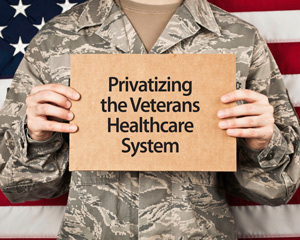By Lori Short, US Lifeline Analyst
 For years, the Veterans Healthcare Administration (VHA) has been criticized for poor care, long wait times, and all-around mismanagement of funds. But it wasn’t until summer of 2014 when, through whistleblower reports, it was discovered that scheduling failures within the Phoenix VA Healthcare System were more than likely responsible for the deaths of 40 veterans. Long waits for appointments, along with senior executives who falsified records by creating “alternate wait lists” in order to claim large bonuses based on efficiency, sent shockwaves through the entire system. In the end, through a nationwide assessment of all facilities, these issues proved to be the norm.
For years, the Veterans Healthcare Administration (VHA) has been criticized for poor care, long wait times, and all-around mismanagement of funds. But it wasn’t until summer of 2014 when, through whistleblower reports, it was discovered that scheduling failures within the Phoenix VA Healthcare System were more than likely responsible for the deaths of 40 veterans. Long waits for appointments, along with senior executives who falsified records by creating “alternate wait lists” in order to claim large bonuses based on efficiency, sent shockwaves through the entire system. In the end, through a nationwide assessment of all facilities, these issues proved to be the norm.
After weeks of intense investigations and growing criticism, VHA secretary Eric Shinseki resigned on May 30, 2014, leaving behind the massive task of repairing the country’s largest healthcare system to the organization’s new leader, Robert MacDonald, former CEO of Procter & Gamble.
What to do? A year later, most VA locations still suffer with interminable wait times, even though billions of dollars have been allocated to “fix the problems.”
One of the biggest fixes to date aimed at reducing appointment delays is the Veterans Choice Program (VCP), authored by Senator John McCain and signed into law by President Obama in August 2014, which is in itself a step toward privatization. It allows VA beneficiaries to visit private-sector doctors if they cannot get a timely appointment, or cannot find local specialty services within the VA. Faced with its share of challenges, VCP was initially unavailable to many people who needed it because of distance restrictions (figuring distance on “as the crow flies” vs. a true distance to travel to the appropriate hospital or clinic). That ruling was changed, and eligibility is now based on actual driving distance.
While the Veterans Choice Program, according to the VA, is still not being fully utilized, it has cost the government over $7.7 billion to date. That number is shocking, but even more so when the VA currently sits with over 41,500 vacant positions1 for doctors, nurses, and other health professionals. And to top it off, the system is now in the hole in the amount of $2.5 billion, and is begging Congress for additional funding, or the ability to “move money around,” or face the closure of several VA hospitals.
Construction cost overruns and delays are also siphoning money out of the system. In particular, officials announced that it will now cost $1.73 billion to build a VA hospital in the Denver suburb of Aurora, a hospital which was originally budgeted at $328 million.
The inefficiencies keep piling up. Could total privatization be far behind?
The effort to privatize elements of the VA system is a priority of the Koch brothers-backed group, Concerned Veterans for America (CVA), which in February 2015 called for creating a “premium-support private insurance option” for current veterans and limiting eligibility requirements for future veterans. The proposed system would be turned into an independent, government-chartered nonprofit corporation.
Some details of the CVA proposal …
- The Veterans Health Administration would be split into two organizations, one that deals with health insurance and another — an independent nonprofit government corporation separate from Veterans Affairs — that oversees VA health facilities.
- Veterans enrolled in the VA healthcare system would still be eligible for free VA healthcare but would have the option of choosing private healthcare with co-pays and deductibles. Patients would be able to transfer federal funds spent on their care at the VA to help pay for private healthcare.
- Future veterans would have to use the new system and be subject to cost-sharing depending on their level of disability or financial need. Lowest-need veterans would not be included in the program.
The question for policymakers, then, is whether to fix the VA system or dismantle it through privatization. A growing number of Republicans prefer the latter and others, like Senator John McCain, believe the VA excels in providing quality care for military-service illnesses and injuries, which the private sector cannot match due to its specialized nature. He wants to streamline the VA to focus on providing that specialty care at which they excel, and give the rest of the resources to the veterans themselves to seek out the best care they can find.
What happens next is anybody’s guess, but all agree that something must be done to fix what’s broken.
